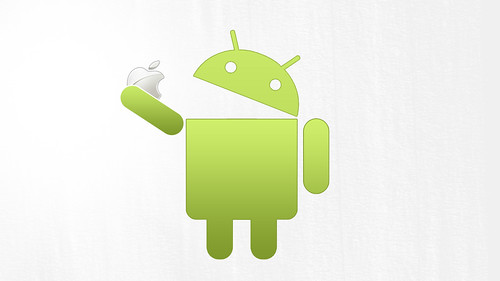Saturday, 30 July 2011
Me and my Android
I'm typically a very late adopter when it comes to hardware. Software enthusiast, settings tinkerer, mash-up fan... but often on ancient hardware. Spot the erstwhile programmer.
And so it has been that I've clung to Windows Mobile far longer than than the zeitgeist deems seemly. The cool kids at work have been flashing their iPhones and iPads for years. But while I adore the wonderful design aesthetic and usability of Apple's hardware products, I've been happy to stick with the typically greater functionality of older and unfashionable devices.
More than this, though, I have a kind of horror of being locked into closed systems. A kind of "ClOStrophobia", if you like. ;-)
It probably goes back to early days learning to program on the Sharp PC1211. It felt like I was pushing to the limit what was possible within the confines of its architecture, before moving on to my next device, the ZX Spectrum. I missed the glory days of the ZX80 and ZX81 because of this obsessive tinkering with older hardware. But I still got to experience the joys of Z80 machine code, Pascal and C. And then trying to push the Amstrad CPC to its limits meant I arrived extraordinarily late at the IBM PC party (some Olivetti machine with a model number I've long since forgotten). But then I ended up working for IBM, so I was there at the start of OS/2.
Incidentally, the stark contrast between the philosophies of OS/2 and Windows at that time probably reinforced my strong preference for open systems over closed systems. IBM's corporate vision for OS/2 at that time was that it would lock customers into a pathway up its huge hardware product range, with PCs (technically IBM PS/2s) at the bottom, and massively expensive mainframes (and service agreements) at the top. The technical vision was also about increasing control over applications, which had been running rampant over the IBM-compatible hardware specification and the DOS operating system. At the same time, OS/2 was fundamentally weakened by having to support legacy IBM hardware, and being slow to support new hardware by other manufacturers. Windows, on the other hand, was all about enhancing the user experience of existing hardware and software, so openness was vital. It wasn't about locking users anywhere, or about controlling applications. It was about making using a computer more pleasurable.
But my main point is that my love of programming meant that when PDAs and smartphones arrived, I became rapidly frustrated at being locked into unmalleable interfaces without open programming environments or even APIs. A "Mickey Mouse device" was what I called such hardware, although I've no idea why.
So I have long been resistant to Apple and its locked-down approach to technology, despite (as I said before) adoring, slightly shamefacedly, the beauty and usability of its products. It's amazed me for 25 years that open, creative, free-thinking types have almost universally worshiped Apple as the rebel against the hegemony of first IBM, then Microsoft and now Google. OK, yes in relation to design; but surely not in relation to a philosophy of openness?
Yet Apple is vital to the technology world, because it sets a terrifically high bar for look-and-feel. This challenges other manufacturers to make their products more aesthetically pleasing than they would otherwise be, and not just as feature-rich, as fast, and as cheap as they can. So I want Apple to succeed. And I don't want it to be eaten by Android, as so charmingly depicted in the image above.
But that doesn't mean that an iPhone or iPad is right for me. So when my 4-year-old Windows Mobile HTC Kaiser began to die slowly in subtle and distressing ways, I finally turned to Android. And even then I've hardly been very bold: a £20 bottom-of-the-range phone (yet somehow with Eclair, Wi-Fi, GPS, 3.2MP camera with flash, accelerometer, compass, FM radio, Bluetooth, USB, HSDPA, MicroSD, and a MS Exchange client).
I was sorely tempted by the Samsung Galaxy S II, but Android still seems very much work-in-progress, so I didn't feel investing too much while its upgrading processes are still so haphazard. The screen and CPU are rubbish, so I'm not going to be playing games on it, and my regular apps (browsing, office, geocaching, file sharing, note-taking) can't be expected to be speedy. But while my Kaiser still has life in it (albeit now unable to support a SIM card) I couldn't see strong enough reasons to spend £450 rather than £20.
I'd also like to explore the tablet form factor, primarily for reading / listening to documents on the move, maybe with some note-taking and commenting. So I've splashed out on an oh-so-last-season-hence-massively-discounted Samsung Galaxy Tab 7".
I've been playing with these two devices on holiday. I've already encountered some accessibility issues, so I might blog about those, although I'm not sure how many people have my particular needs (speech output, weird colours). And Android lets me simplify my geocaching technology considerably, so I might blog about that.
In the meantime, I'll be summoning up all my energies to try to blot out from my consciousness what I'm sure will be a cool and tantalising iPhone 5... ;-)
Image "Android vs Apple" by Saad Irfan.
Subscribe to:
Post Comments (Atom)

No comments:
Post a Comment